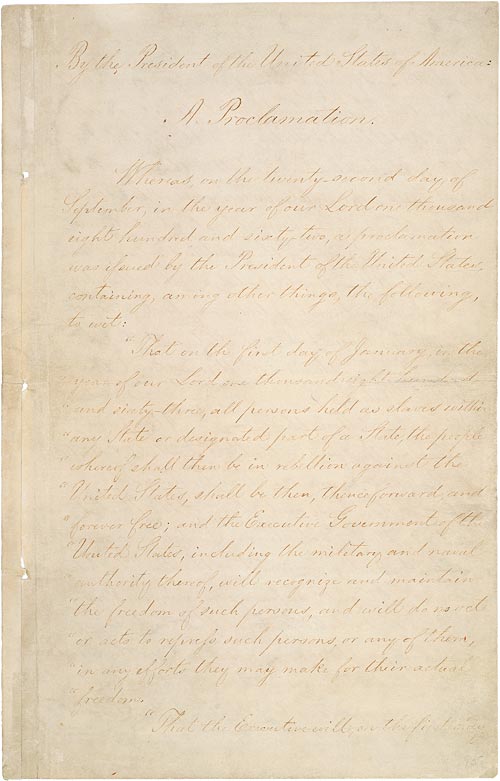
Emancipation Proclamation (1863)
President Abraham Lincoln issued the Emancipation Proclamation on January 1, 1863, announcing, "that all persons held as slaves" within the rebellious areas "are, and henceforward shall be free."
Initially, the Civil War between North and South was fought by the North to prevent the secession of the Southern states and preserve the Union. Even though sectional conflicts over slavery had been a major cause of the war, ending slavery was not a goal of the war.
That changed on September 22, 1862, when President Lincoln issued his Preliminary Emancipation Proclamation, which stated that enslaved people in those states or parts of states still in rebellion as of January 1, 1863, would be declared free. One hundred days later, with the rebellion unabated, President issued the Emancipation Proclamation declaring "that all persons held as slaves" within the rebellious areas "are, and henceforward shall be free."
Lincoln’s bold step to change the goals of the war was a military measure and came just a few days after the Union’s victory in the Battle of Antietam. With this Proclamation he hoped to inspire all Black people, and enslaved people in the Confederacy in particular, to support the Union cause and to keep England and France from giving political recognition and military aid to the Confederacy.
Because it was a military measure, however, the Emancipation Proclamation was limited in many ways. It applied only to states that had seceded from the Union, leaving slavery untouched in the loyal border states. It also expressly exempted parts of the Confederacy that had already come under Union control. Most important, the freedom it promised depended upon Union military victory.
Although the Emancipation Proclamation did not end slavery in the nation, it did fundamentally transform the character of the war. After January 1, 1863, every advance of federal troops expanded the domain of freedom. Moreover, the Proclamation announced the acceptance of Black men into the Union Army and Navy, enabling the liberated to become liberators. By the end of the war, almost 200,000 Black soldiers and sailors had fought for the Union and freedom.
From the first days of the Civil War, enslaved people had acted to secure their own liberty. The Emancipation Proclamation confirmed their insistence that the war for the Union must become a war for freedom. It added moral force to the Union cause and strengthened the Union both militarily and politically. As a milestone along the road to slavery's final destruction, the Emancipation Proclamation has assumed a place among the great documents of human freedom.

